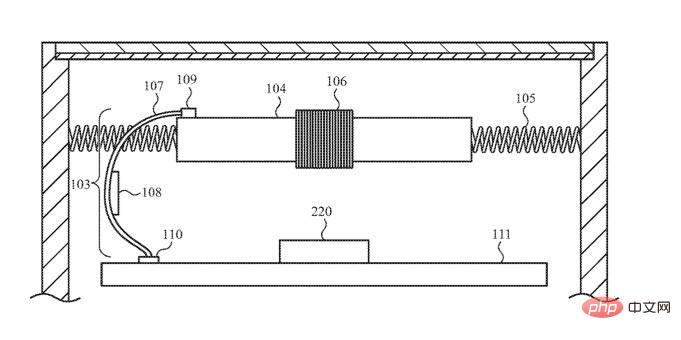Home >Common Problem >A future Apple Watch may move its battery to provide tactile feedback
A future Apple Watch may move its battery to provide tactile feedback
- WBOYWBOYWBOYWBOYWBOYWBOYWBOYWBOYWBOYWBOYWBOYWBOYWBforward
- 2023-04-19 17:16:061575browse
Apple is working on how to make the battery in the Apple Watch move to provide tactile feedback to the wearer.
Apple is continuing its efforts to make the Apple Watch thinner, this time to eliminate the need for a separate Taptic engine. Rather than being taken up by the engine, Apple wanted to see if it could make the battery do double duty as a source of tactile feedback.
The newly granted patent "Portable electronic device having a haptic device with a mobile battery element" is the latest of many attempts to repurpose the haptic engine. Apple has previously considered using haptic wristbands and considered modifying the charging coil to do the same thing.
The objects are the same in each case. Apple is always looking for ways to take components it can't live without and make it do more.
"Traditionally, electronic devices include one or more buttons or electromechanical switches for providing input," the patent application says. "Some devices include touch sensors or touch screens for receiving input. However, touch sensors often lack mechanical feedback to alert the user that input has been registered."
"[The description in this patent application] is directed to a A haptic device that moves battery elements to produce tactilely perceptible pulses or vibrations along the outer surface of the device," it continued.
This means having a battery that is "electrically coupled to the display," and a "coil assembly" that is "configured to induce oscillatory movement of the battery elements parallel to the display to produce tactile output."
In addition to potentially eliminating the need for a separate haptic engine to save space on the Apple Watch, Apple may also use that space for other reasons. Specifically, Apple notes that the current Watch's "battery assembly may be smaller than it would be without the haptic device, reducing possible battery life." What physical processing is done, and how much does it have to move to be effective.
"The smaller the mass of a haptic device, the further the mass may need to be moved by the haptic device to produce the same tactile output," it said. "For example, to produce the same magnitude of tactile output, a first mass that is as large as a second mass can move twice as far."
Details in the patent show a movable device attached to the Apple Watch chassis Battery
So currently the haptic engine takes up space on its own and then takes up more space as it needs to be moved. "So even if the mass is smaller to accommodate the larger battery element, the additional space required for the haptic device to move the mass may still limit the available space for the battery element size."
"Larger battery elements may require more Small haptic devices, which may not have a large enough mass and/or move the mass far enough to produce the required magnitude of tactile output," Apple said.
The patent attempts to propose a solution for this balance between component size and functionality, and is credited to six inventors, including Erik G. de Jong. His previous related work includes a patent covering a method for using an Apple Watch band to provide a hidden battery.
The above is the detailed content of A future Apple Watch may move its battery to provide tactile feedback. For more information, please follow other related articles on the PHP Chinese website!

